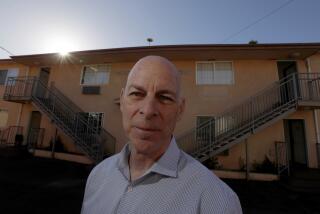Experts Say Low-Income Housing Program Not Easily Abused : Tax credits: Gary Lefkowitz’s alleged misdeeds began in the program’s early years, when regulatory oversight was minimal, authorities say.
- Share via
Housing experts and regulators say the misconduct alleged in the Gary Lefkowitz case does not indicate that the low-income housing tax-credit program is susceptible to easy abuse.
But some government and industry officials acknowledge that regulatory oversight was minimal in the program’s early years, when Lefkowitz was gaining a foothold as a syndicator of low-income housing projects.
The experts say the misdeeds of which he is accused amount to securities fraud that could as easily have involved oil wells or windmills as low-income housing.
The lesson, they say: Any government program can be subverted.
“Because someone abuses the system does not mean the system is flawed,” said John McEvoy, executive director of the National Council of State Housing Agencies.
When the tax credits first became available, some states had to quickly create and fund agencies to run the program. The regulations were complex and little understood. It often was unclear whether the state or federal government was responsible for enforcing regulations.
As a result, compliance monitoring often was superficial, said James Solem, former commissioner of the Minnesota Housing Finance Agency. For instance, it was not clear that state agencies had the right to demand financing details from developers or syndicators, he said, because no direct government subsidy was being provided.
“You ended up with a system where the ability to get full disclosure was nearly impossible,” Solem said.
Confusion also arose because oversight was dispersed among 50 state housing agencies, the Internal Revenue Service and state and federal securities regulators.
Rules varied widely from state to state. Some states reserved tax credits on a developer’s word that permanent financing was in place and then issued the credits when told a project was finished--without ever inspecting the site.
“Both its complexity and decentralized administration opens the program up to possible corruption,” said Peter Drier, former director of Boston’s housing program, who now is a professor of public policy at Occidental College in Eagle Rock.
But the rules have tightened.
A study by a task force of state housing agencies recommended close monitoring of building costs, limits on developer and consultant fees, required site visits and stronger penalties for fraudulently obtaining tax credits.
“There are more and more safeguards being added each year,” said Michael Novogradac, a San Francisco accountant and low-income housing expert.
Now, abuses are less a concern to most housing experts than is the program’s efficiency. Critics argue that the credits cost too much and produce too little housing. They note that about half of every dollar of tax credit is eaten up by fees paid consultants, lawyers and syndicators.
“It’s like feeding the horses to feed the sparrows,” said Dreier, who argues that direct grants to developers or tenants would be more efficient.
Despite the criticism, the program has widespread, bipartisan support; more than 400 members of Congress sponsored the bill last year making it a permanent part of the tax code.
One reason is that it is the only game in town.
The program has provided more than 600,000 affordable housing units in the last seven years. About 125,000 units are expected to be built this year at a cost to the federal treasury of nearly $3 billion over 10 years.
Today, the program is dominated by powerful players. Boston Financial Group and Related Capital Corp. are major syndicators that often work with nonprofit groups, such as the Local Initiatives Support Corp. Most equity now comes from rich corporations such as Bank of America, Chevron and Campbell Soup.
More to Read
Sign up for Essential California
The most important California stories and recommendations in your inbox every morning.
You may occasionally receive promotional content from the Los Angeles Times.








